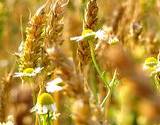|
Grandma's Vitamin B3 Niacin GuideVitamin B3 is needed for proper circulation and healthy skin. It aids in the functioning of the nervous system, in metabolism of carbohydrates, fats, and proteins, and in the production of hydrochloric acid for the digestive system. Niacin is involved in the normal secretion of bile and stomach fluids, and in the synthesis of sex hormones. Vitamin B3 lowers cholesterol and improves circulation. It is helpful for schizophrenia and other mental illnesses, and is also a memory-enhancer. Pellagra is a disease caused by niacin deficiency. Other symptoms of niacin deficiency include:
Food and Herbal Sources of NiacinNiacin and Niacinamide are found in Foods:
Herbal Sources of Niacin
Comments: A flush, usually harmless, may occur after the ingestion of niacin supplements; a red rash appears on the skin and a tingling sensation may be experienced as well. Cautions People who are pregnant or who suffer from diabetes, glaucoma, gout, liver disease, or peptic ulcers should use niacin supplements with caution. Amounts over 500 milligrams daily may cause liver damage if taken for prolonged periods.
|








